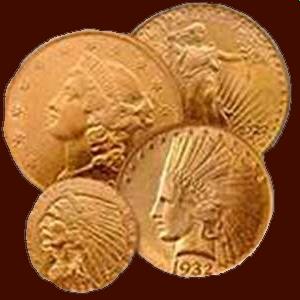








Designed by Nigel G Wilcox





The Paragon Of Metal Detecting
& Archaeology
& Archaeology
Powered By Sispro1
Denarius
For Reference ONLY
Everything For The Detectorist
Roman Denarius BC - Currency Numismatics,
**
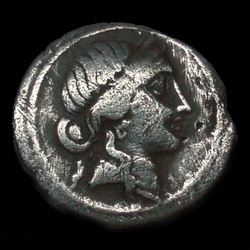

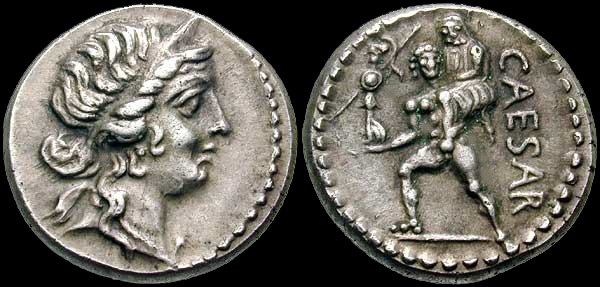
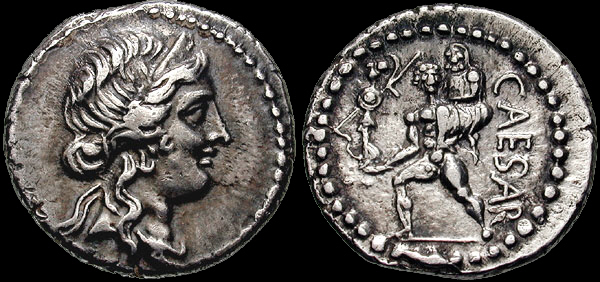
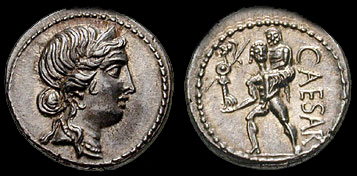


Julius Caesar 47-46 BCP
Three candidates stood for the consulship: Caesar, Marcus Calpurnius Bibulus, who had been aedile with Caesar several years earlier, and Lucius Lucceius . The election was dirty. Caesar canvassed Cicero for support, and made an alliance with the wealthy Lucceius, but the establishment threw its financial weight behind the conservative Bibulus, and even Cato, with his reputation for incorruptibility, is said to have resorted to bribery in his favour. Caesar and Bibulus were elected as consuls for 59 BC.
Caesar was already in Crassus' political debt, but he also made overtures to Pompey, who was unsuccessfully fighting the Senate for ratification of his eastern settlements and farmland for his veterans. Pompey and Crassus had been at odds since they were consuls together in 70 BC, and Caesar knew if he allied himself with one he would lose the support of the other, so he endeavoured to reconcile them. Between the three of them, they had enough money and political influence to control public business. This informal alliance, known as the First Triumvirate (rule of three men), was cemented by the marriage of Pompey to Caesar's daughter Julia . Caesar also married again, this time Calpurnia , daughter of Lucius Calpurnius Piso Caesoninus, who was elected to the consulship for the following year.
Caesar proposed a law for the redistribution of public lands to the poor, a proposal supported by ompey, by force of arms if need be, and by Crassus, making the triumvirate public. Pompey filled the city with soldiers, and the triumvirate's opponents were intimidated. Bibulus attempted to declare the omens unfavourable and thus void the new law, but was driven from the forum by Caesar's armed supporters. His lictors had their fasces broken, two tribunes accompanying him were wounded, and Bibulus himself had a bucket of excrement thrown over him. In fear of his life, he retired to his house for the rest of the year, issuing occasional proclamations of bad omens. These attempts to obstruct Caesar's legislation proved ineffective. Roman satirists ever after referred to the year as "the consulship of Julius and Caesar".
This also gave rise to this lampoon-
The event occurred, as I recall, when Caesar governed Rome-Caesar, not Bibulus, who kept his seat at home.
When Caesar and Bibulus were first elected, the aristocracy tried to limit Caesar's future power by allotting the woods and pastures of Italy, rather than governorship of a province, as their proconsular duties after their year of office was over.With the help of Piso and Pompey, Caesar later had this overturned, and was instead appointed to govern Cisalpine Gaul (northern Italy) and Illyricum (the western Balkans), with Transalpine Gaul (southern France) later added, giving him command of four legions. The term of his proconsulship, and thus his immunity from prosecution, was set at five years, rather than the usual one. When his consulship ended, Caesar narrowly avoided prosecution for the irregularities of his year in office, and quickly left for his province.
Three candidates stood for the consulship: Caesar, Marcus Calpurnius Bibulus, who had been aedile with Caesar several years earlier, and Lucius Lucceius . The election was dirty. Caesar canvassed Cicero for support, and made an alliance with the wealthy Lucceius, but the establishment threw its financial weight behind the conservative Bibulus, and even Cato, with his reputation for incorruptibility, is said to have resorted to bribery in his favour. Caesar and Bibulus were elected as consuls for 59 BC.
Caesar was already in Crassus' political debt, but he also made overtures to Pompey, who was unsuccessfully fighting the Senate for ratification of his eastern settlements and farmland for his veterans. Pompey and Crassus had been at odds since they were consuls together in 70 BC, and Caesar knew if he allied himself with one he would lose the support of the other, so he endeavoured to reconcile them. Between the three of them, they had enough money and political influence to control public business. This informal alliance, known as the First Triumvirate (rule of three men), was cemented by the marriage of Pompey to Caesar's daughter Julia . Caesar also married again, this time Calpurnia , daughter of Lucius Calpurnius Piso Caesoninus, who was elected to the consulship for the following year.
Caesar proposed a law for the redistribution of public lands to the poor, a proposal supported by ompey, by force of arms if need be, and by Crassus, making the triumvirate public. Pompey filled the city with soldiers, and the triumvirate's opponents were intimidated. Bibulus attempted to declare the omens unfavourable and thus void the new law, but was driven from the forum by Caesar's armed supporters. His lictors had their fasces broken, two tribunes accompanying him were wounded, and Bibulus himself had a bucket of excrement thrown over him. In fear of his life, he retired to his house for the rest of the year, issuing occasional proclamations of bad omens. These attempts to obstruct Caesar's legislation proved ineffective. Roman satirists ever after referred to the year as "the consulship of Julius and Caesar".
This also gave rise to this lampoon-
The event occurred, as I recall, when Caesar governed Rome-Caesar, not Bibulus, who kept his seat at home.
When Caesar and Bibulus were first elected, the aristocracy tried to limit Caesar's future power by allotting the woods and pastures of Italy, rather than governorship of a province, as their proconsular duties after their year of office was over.With the help of Piso and Pompey, Caesar later had this overturned, and was instead appointed to govern Cisalpine Gaul (northern Italy) and Illyricum (the western Balkans), with Transalpine Gaul (southern France) later added, giving him command of four legions. The term of his proconsulship, and thus his immunity from prosecution, was set at five years, rather than the usual one. When his consulship ended, Caesar narrowly avoided prosecution for the irregularities of his year in office, and quickly left for his province.
Roman Emperor Timeline
Roman Menu
Copyright © All Rights Reserved by Nigel G Wilcox · · E-Mail: ngwilcox100@gmail.com
Denarius
Pages
Main Coin Menu

VIEW ALL
Member NCMD
R.B.C. Menu
Information Data
























